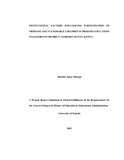| dc.description.abstract | The purpose of this study was to investigate the institutional factors influencing
participation in primary education by OVCs in Dagoretti district, Kenya. The
objectives of the study were to establish the effect of the availability of
psychological support, identify strategies employed by primary school
headteachers in enhancing participation in primary education and determining the
extent to which school levies affect participation in primary education in
Dagoretti District. In addition, the study determined the influence of teachers
training on transition to primary schools, extent to which primary school
headteachers support learners from needy backgrounds as well as the extent to
which supportive school leadership and teachers influence OVCs’ participation in
primary education in Dagoretti District. This study relied on the Maslow’s theory
of human needs and motivation. The theory was applicable since institutional
factors influencing participation in primary education by orphans and vulnerable
children are largely determined by level of school management. At the same time,
the transition theory portrays the management of school as responsible for
innovation and creation of conducive environment that is necessary for transition
to primary schools to be effective. The study used descriptive survey design and
the target population comprised of the headtechers in all 25 public primary
schools in Dargoretti District and 92 teachers were selected. This study used
questionnaires to collect data where each set of questionnaires had two sections.
Section one presented demographic information while section two explored
general information on transition. The researcher then conducted a pilot study
before the administration of research instrument which enabled the researcher to
refine the instrument by making corrections based on the observation made, add
new items, delete some items and access the time taken by the respondent to fill
the questionnaire. To establish the reliability of the instrument, the researcher
used the test-retest techniques. This involved administering the test to an
appropriate group. The Pearsons’ Correlation Coefficient for this study was
found to be averaging at 0.87 for all sets of questionnaires and thus the tools were
reliable. After some time had passed, the same test was administered to the same
group. It was done by administering the instruments to the total respondents in the
pilot study. An authorization to conduct the research was sought from the
National Council of Science and Technology as well as the consent of the District
Commissioner Dagoretti District to conduct research in Dagoretti District. The
study generated both qualitative and quantitative data. For the quantitative data,
analysis of the data was done through descriptive statistics by use of frequencies
and percentages and averages while qualitative data was first organized into
themes corresponding to the study objectives. From the study the researcher
concludes that, participation in primary education education by orphans and
vulnerable children is largely determined by both the availability of learning
institution, amount of school levies charged, involvement in teachers training and
intervention of school administration. These constitute both the micro (household)
and macro (country’s) economic challenges. This is mainly because accessibility
is improved and at the same time costs related to transportation are reduced as a
school is available closer to the household. Therefore and based on the findings of
this study, the researcher gives the following recommendations aimed at
improving pupils’ participation in primary education in Dargoretti district as well
as countrywide at large. Since the Kenyan education system insists on a free and
compulsory primary education as we as a free secondary education, the
government should instigate effective machineries to ensure that adequate
secondary institutions are available for all pupils. There should be well enhanced
and effective curriculum programmes that enhance smooth learning for children
with difficulties. The curriculum should also be integrated with life skill
programmes that are part of early child developments. The government through
the Ministry of Education should ensure quality assurance to enhance supervision
in OVC’s needs and catered for in schools. In addition, it should provide policies
and implantation guidelines for OVC interventions to all regional and local
government departments. MOE should also ensure that the provisions for free
primary education are enforced supervised and monitored. | en |

